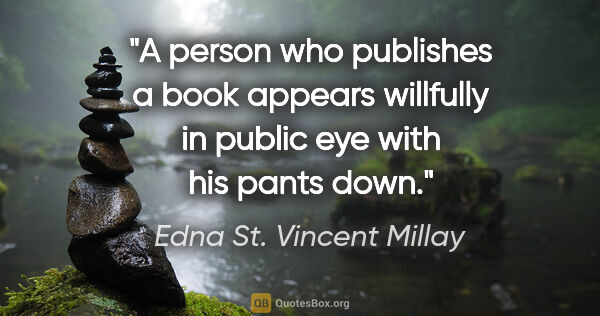Publishing Books Quotes (page 4)
Then all at once our personal and political quarrels were made very abruptly to converge. In the special edition of the London Review of Books published to mark the events of September 11, 2001, Edward painted a picture of an almost fascist America where Arab and Muslim citizens were being daily terrorized by pogroms, these being instigated by men like Paul Wolfowitz who had talked of 'ending' the regimes that sheltered Al Quaeda. Again, I could hardly credit that these sentences were being...
Christopher Hitchens
Wrong' training can be a very innocent thing. Consider a father who allows his child to read good books. That child may soon cease to watch television or go to the movies, nor will he eventually read Book-of-the-Month Club selections, because they are ludicrous and dull. As a young man, then, he will effectually be excluded from all of Madison Avenue and Hollywood and most of publishing, because what moves him or what he creates is quite irrelevant to what is going on: it is too fine. His...
Paul Goodman
If you try to write posthumously, however, fashion doesn’t apply. You step off the catwalk, ignoring this season’s trends and resigning yourself to being unfashionable and possibly unnoticed, at least for a while. As Kurt Woolf, Kafka’s first publisher in Germany, wrote to him after Kafka’s book tanked, “You and we know that it is generally just the best and most valuable things that do not find their echo immediately.” Fashion is the attempt to evade that principle: to be the echo of someone...
Jeffrey Eugenides
From the essay "Twenty-five Things People Have a Shocking Capacity to Be Surprised by Over and Over Again"1. Journalists sometimes make things up.2. Journalists sometimes get things wrong.3. Almost all books that are published as memoirs were initially written as novels, and then the agent/editor said, This might work better as a memoir.6. Freedom of the press belongs to the man who owns one.
Nora Ephron
If anyone in your publishing life were to argue against a particular book or a career aspiration for reasons you had not already pondered and rejected after careful analysis, if they dazzled you with brilliant new considerations, then you’d have to back off and revisit your decisions. But what I was told never dazzled me. For example, I was often advised, by different people, that my work would never gain a big audience because my vocabulary was too large.
Dean Koontz

On Ira Gershwin: I remember when he was given the manuscript of a novel written by a woman friend who had hopes of having it published. To his astonishment it turned out to be the dirtiest, most pornographic book he had ever read. When the lady mentioned that she intended to use a nom de plume, Ira suggested she call herself Henrietta Miller.
Oscar Levant
If I never had another book published, and it was very clear to me that this was a real possibility, I still had to go on writing. I'm glad I made this decision in a moment of failure. It's easy to say you're a writer when things are going well. When the decision is made in the abyss, the in is quite clear that it is not one's own decision at all.
Madeleine L'Engle
Jonathan Swift (November 30, 1667? October 19, 1745) was an Irish cleric, satirist, essayist, political pamphleteer (first for Whigs then for Tories), and poet, famous for works like Gulliver's Travels, A Modest Proposal, A Journal to Stella, The Drapier's Letters, The Battle of the Books, and A Tale of a Tub. Swift is probably the foremost prose satirist in the English language, although he is less well known for his poetry. Swift published all of his works under pseudonyms? such as Lemuel...
Jonathan Swift
A poet, a really great poet, is the most unpoetical of creatures. But inferior poets are absolutely fascinating. The worse their rhymes, the more picturesque they look. The mere fact of having published a book of second-rate sonnets makes a man quite irresistible. He lives the poetry he cannot write. The others write the poetry they dare not realise.
Oscar Wilde
When my head is in the typewriter the last thing on my mind is some imaginary reader. I don’t have an audience; I have a set of standards. But when I think of my work out in the world, written and published, I like to imagine it’s being read by some stranger somewhere who doesn’t have anyone around him to talk to about books and writing—maybe a would-be writer, maybe a little lonely, who depends on a certain kind of writing to make him feel more comfortable in the world.
Don DeLillo

